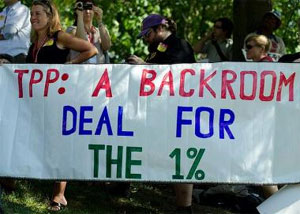Since we reported on Fast-Track legislation
for the Trans-Pacific Partnership (TPP) last week, WikiLeaks has revealed a draft
of the Environment Chapter, giving us more insight into this
corporate-oriented pact.
Although President Obama says he will not support a
pact without strong environmental and labor provisions, he is pushing hard
for Congress to Fast-Track a treaty that doesn’t have those protections.
The TPP is crucial because it involves 12 nations that are
responsible for a third of world trade.

The Environmental Chapter (one of 29 chapters), covers any environmental
issue that’s related to trade – including climate change, trade and
investment in green goods and services, biodiversity and fishing stocks –
and describes how environmental disputes would be resolved.
Reading the chapter, it becomes clear that the parties have yet to agree on
many details and is, in fact, one of four chapters where negotiators are at a
stalemate – the others are intellectual property, transparency in healthcare
technologies and state-owned enterprises.
Last fall, 24 environmental organizations, including the
Sierra Club, Natural Resources Defense Council (NRDC) and World Wildlife Fund,
sent a letter to Ambassador Froman, the US Trade Representative, that
details what strong, legally enforceable environmental protections would
mean: elimination of subsidies that promote overfishing; a trade ban
on illegally harvested timber, wildlife, and fish; and obligations to
uphold domestic environmental laws.
"We’re asking for some really basic protections like don’t subsidize
unsustainable fisheries and don’t do illegal things," Jake Schmidt, international climate policy director for NRDC, told National Geographic. "The overarching problem is that there’s no enforcement, he says. While it say partners should take steps to protect the
environment, the word ‘shall’ is rarely used and is often paird with ‘seek to’ or ‘attempt,’ which are not legally enforceable.
“If the environment chapter is finalized as written in this leaked document,
President Obama’s environmental trade record would be worse than George W.
Bush’s,” says Michael Brune, executive director of the Sierra
Club. "This draft chapter falls flat on every single issue
– oceans, fish, wildlife and forest protections – and in fact, rolls back
progress made in past free trade pacts."
In
2007, Congress and the Bush Administration reached bipartisan consensus on
trade pacts and since then, the environment chapters of all US free trade
agreements have been legally enforceable and included a list of environmental
treaties that countries committed to uphold. The leaked TPP text does not
meet this standard.
"Environmental protections are only as effective as their
enforcement provisions, and a trade agreement with weak enforcement language
will do little or nothing to protect our communities and wildlife,"
says Peter Lehner, executive director of the NRDC. "Considering the dire state of many fisheries
and forests in the Asia-Pacific region and the myriad threats to endangered
wildlife, we need a modern trade agreement with real teeth, not just
empty rhetoric."
For example, the document encourages participating governments to
"voluntarily" implement ocean conservation practices.
Massive fracking would result because it requires the US to export natural gas.
"When compared against other TPP chapters, the
Environment Chapter is noteworthy for its absence of mandated clauses or
meaningful enforcement measures," says WikiLeaks. "The dispute
settlement mechanisms it creates are cooperative instead of binding; there are
no required penalties and no proposed criminal sanctions.
The fact that obligations are weak and compliance is
unenforceable is even worse because other chapters subordinate the
environment, natural resources and indigenous rights to commercial objectives
and business interests. The corporate agenda wins both ways, says Jane
Kelsey, an environmental law professor at the University of Auckland
in New Zealand, who analyzed the text.
In a blog post responding to the leak, the Office of
the U.S. Trade Representative says "stewardship is a core
American value, and we will insist on a robust, fully enforceable environment
chapter in the TPP or we will not come to agreement."
No agreement would be great because this treaty could be the final step toward corporate control. Multinational corporations would be able to “protect their future profit potential” by suing cities, counties, states or countries to wipe out existing laws – those specifically designed to protect communities’ best interests, but which get in the way of ultimate profits.
Forget environmental requirements, minimum wage, food safety regulations, the right to ban GMOs or fracking – any local ordinance could be challenged as a "barrier to trade."
If Congress votes Yes on the Fast-Track
bill (Bipartisan Congressional
Trade Priorities Act of 2014), it’s voting to tie its hands on all trade
deals, including the US-EU pact. If passed, future trade deals
could be signed by the President and simply sent to Congress for an
up-or-down vote, required within 90 days. No amendments would be allowed
and even debate would be limited.
Read the US Trade Rep’s response:

I’d be wary of anything published by WikiLeaks as they are not exactly the New York Times when it comes to reporting on “secret” drafts. Rather, in English and wait until some government official (whether the in the US or another country involved in this deal) confirms this draft as authentic before we rush to judgment.